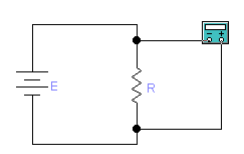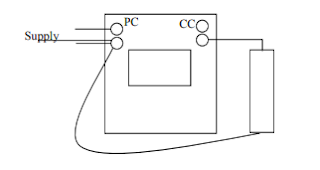Ammeter
Measuring current in electronics is a very necessary thing. Just as we need electronics in our lives, so do we need ammeter to use them. As we know, the current in the series remains the same. The ammeter, since it measures current, is connected in series with the circuit under test. Because there is only one current path in a series circuit, all of the circuit current flows through the meter. Sometimes we say, the internal resistance of the ammeter is zero, but the ammeter must introduce minimum additional resistance into the circuit. However, since it is much less, we can avoid this resistance value. Due to this internal resistance, our measurement does not have a problem, because as I said before, the current in the series remains the same.
 |
| Ammeter Connection |
Voltmeter
Voltage is one of the most important quantities in electronics. The dc voltmeter enables us to measure any value of dc voltage between two points in an electric circuit within the capability of the meter. It is thus in parallel with the circuit or some part of the circuit. To be used in this way, a voltmeter must have enough resistance so that it will not be injured by the current that flows through it, and so that it will not materially affect the current in the circuit to which it is connected. The dc voltmeter has a basic meter movement, commonly called a moving coil or D Arsenoval type movement, and one or more series resistors known as multiplier resistors. As the name implies, multiplier resistors increase, or multiply the range of the basic meter movement.
 |
| Voltmeter Connection |
Wattmeter
Measuring power is very important part in electricity. Wattmeter is an electric measuring device, that measure electric power in watt from a given circuit. We know, by measuring voltage and current from a line we can measure power. That’s why its operation is like using two measuring device at a time. These are voltmeter and ammeter. This instrument is similar in design and construction to electrodynamometer type ammeters and voltmeters. The two coils are connected to different circuits for measurement of power. The fixed coils or ‘field coils’ are connected in series with the load and so carry the current in the circuit. The fixed coil therefore forms the current coil or simply c.c. of the wattmeter.
 |
| Wattmeter Connection |
The moving coil is connected across the voltage and therefore carries a current proportional to the voltage. A high non-inductive resistance is connected in series with the moving coil to limit the current to a small value. Since the moving coil carries a current proportional to the voltage, it is called the ‘pressure coil’ or ‘voltage coil’ or simply called p.c. of the wattmeter.















0 Comments